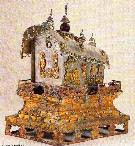| |
| 618 - 907 |
 Yang, the second and last emperor of the Sui Dynasty (581 - 618) proved to be unpopular due to his tyranny. Unrest amongst the population was rife due to the heavy toll on life through such projects as the Grand Canal, coupled with continual military campaigns and profligate spending. Liyuan, an aristocratic official stationed in Taiyan, seized the opportunity to assume control of the capital, Chang'an (now Xian City in Shaanxi Province). Taking advantage of the political turmoil and with the aid of his son, Li Shimin, Liyuan declared that Emperor Yang had retired and set Yang's son Emperor Gong upon the throne, in 617. Yang, the second and last emperor of the Sui Dynasty (581 - 618) proved to be unpopular due to his tyranny. Unrest amongst the population was rife due to the heavy toll on life through such projects as the Grand Canal, coupled with continual military campaigns and profligate spending. Liyuan, an aristocratic official stationed in Taiyan, seized the opportunity to assume control of the capital, Chang'an (now Xian City in Shaanxi Province). Taking advantage of the political turmoil and with the aid of his son, Li Shimin, Liyuan declared that Emperor Yang had retired and set Yang's son Emperor Gong upon the throne, in 617.
The following year, while under siege in Jiangdu (now Yangzhou City in Jiangsu Province), Emperor Yang was assassinated by an aide. On hearing this news, Liyuan deposed the puppet prince and declared himself emperor taking as his temple name Gauzu. Over the next ten years all opposition to Emperor Gauzu was eliminated and his new regime effected a reunification of the whole of China in 628 AD.
The Tang Dynasty, which maintained its rule for nearly 300 years, is probably the most well-known dynasty in Chinese history. Successively witnessing three florescences, namely "the Prosperity of Zhenguan", the reign of Emperor Wu and "the Heyday of Kaiyuan" in its period, the Tang Empire justifiably became the largest, richest and most sophisticated state in the world at that time. Greatly and widely admired abroad, the Tang influence spread into Asia, Europe and Africa. Neighbouring countries sought and established ties with the empire and Chang'an became the center of cultural exchange between the East and the West.
This was an epoch that was unprecedented in China. Dominance in the fields of politics, economics, military power and foreign relations exceeded all that had gone before. In terms of culture, the one thing that places the Tang Dynasty above all others is the literature of the age. The brilliance of poetry during the period attests to an unparalleled and glorious flowering of creativity.
|
|
